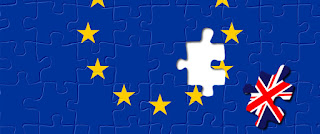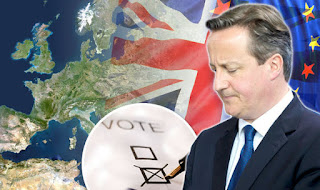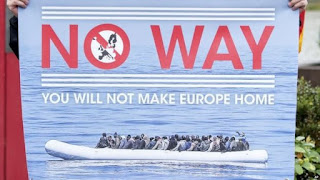The mayor of one of these seaside towns on the French Riviera has declared "if you don't want to live the way we do, don't come."
"You have to behave in the way that people behave in the country that accepted you, and that is it," Cogolin Mayor Marc Etienne Lansade told CNN.
The ruling came after more than 30 French towns banned the swimsuit, which covers the whole body except for the face, hands and feet and is worn mostly by Muslim women. Officials have said the ban on the outfit was a response to growing concerns about radical Islamic terrorism. (CNN)
In some occasions, like in the picture above in Nice, women were forced to remove their garment by policemen. Even more disturbingly, there have been reports that some of the people witnessing the occasion, were shouting ‘go home’, while others were applauding the police.” (The Guardian)
This is a worrying development, that is affecting not just France but the rest of Europe too. The continent's public opinion has been long debating its values and where our multicultural model is heading.
In addition, France is not the only country that is experiencing a crisis of cultural, political and societal identity. The refugee crisis, the EU expansion to the East, the euro-zone crisis and the recent Brexit, have all added further stress to Europe's selfhood impasse.
Some cases like that of the Brexit, are actually a pristine indicator of the massive shift or confusion of the European public opinion, on its identity or future.
Our continent is changing that is for sure. Free movement of people, an ever changing society, economy and political environment are forcing Europe to reinvent itself. And as in every transition period, a massive soul searching is always under way.
European people, like every single person going through change, are trying to imagine or create a future model that they will like to follow and aspire to. Some are trying desperately to hold on to what it is, others are striving to go back to what it was, while only few are looking to the future, open to all possibilities and outcome.
Countries like Britain chose to look backwards and turn to the British Commonwealth for stability and security. Whilst many new EU member states like Hungary and Poland, are trying to resist change and keep things as they are.
Migrants pose new challenges and they will change the current demographic, societal, cultural and political homogeneity of these nations. Especially when we are talking for migrants of different race, religion or cultural background.
Very few European nations still fully embrace modernity and the inevitable change that is bringing. What is happening in France is not just a French problem and could potentially spread to other nations.
Especially if the terror attacks on European soil continue. People need scapegoats when threatened, they want to see someone paying for their misfortunes and fear. Humans used to sacrifice animals or even each other when faced with phenomena they did not understand or could not control.
As Europe is faced with an ever growing threat from Islamist extremists, anything that reminds of them will become a target. There is no doubt that the burkini ban incidents are directly linked to the recent terror attacks in France; a knee-jerk reaction deriving from anger and fear, plus the very statement that Europe's enemies would love to receive.
It the mentality of the herd; if you wanna live among us, look and behave like us or we will kick you out of our group. It's a very primeval, deep rooted thing and it affects all nations.
It does make sense of course, when you move in one country and take its citizenship, you should abide by its laws and values. Currently secularism, freedom and democracy make up the core of our values.
But is a dress code representative of those and if yes, is forcibly removing it also doing justice to our principles? I personally detest burkas or niqabs as I see no point of any religious dress-code at this day and age.
I do not believe that any dogma and the obvious declaration of it such a burka, have any place in the Europe that we are trying to build.
Yet I also think that policing and forcibly making people to abandon their own values, no matter how un-European they may be, has anything to do with the society I would like to live in.
Assuming that we start accepting policing and dress-code control on Muslim people in our continent, who could be next? Which group will we have to "conform" to fit our values in the future?
If we are so weary of our culture and we think that we need to "protect" or "safeguard" it from foreign influences, then perhaps this is a sign of how weak or declining this culture of ours is.
We should be looking at why people who have been living in our continent for decades or even were born here, have failed to integrate in our societies.
Integration comes with acceptance and education. It comes with equal opportunities and recognition. Being an immigrant myself, I must confess that all the times I felt anger towards my new host country, were when I felt rejected by its society and in return I was rejecting anything indicative of its culture.
So if these non-European individuals show signs of "rejecting" our values, perhaps they are doing so because they do not feel welcomed or part of our societies. Or maybe they are not inspired by them. Thus certainly forcefully making them remove their garments is not going to help.
You do not "force" anyone to accept your culture or values, you incite them to do so, you make them feel that abandoning their old ways is making sense for their future. If they do not, then we ought to firstly look where we as a society has failed, then debate on if they really belong here or they should be "going home".
If we decide that we do not want immigration into our lands, then we should stop bragging that we are an open and tolerant continent and call a spade a spade; that we do not wish to live in a multicultural society, we reject the current economic model that is promoting it and we prefer to live in social nationalism or something similar.
But could we accept the consequences, do we really know what that will mean and how will affect our lives?
The future European continent is in our hands. We are designing it right now with our decisions, our votes, our actions and what we stand for. It is a work in process that will take a long time.
We can either become like those nations that we so much criticize on their lack of tolerance and openness, or we will become the complete opposite to them and stick to it. This will be our statement and our answer to their inhuman, conservative, outdated, oppressive lack of progress and modernity.
In some occasions, like in the picture above in Nice, women were forced to remove their garment by policemen. Even more disturbingly, there have been reports that some of the people witnessing the occasion, were shouting ‘go home’, while others were applauding the police.” (The Guardian)
This is a worrying development, that is affecting not just France but the rest of Europe too. The continent's public opinion has been long debating its values and where our multicultural model is heading.
In addition, France is not the only country that is experiencing a crisis of cultural, political and societal identity. The refugee crisis, the EU expansion to the East, the euro-zone crisis and the recent Brexit, have all added further stress to Europe's selfhood impasse.
Some cases like that of the Brexit, are actually a pristine indicator of the massive shift or confusion of the European public opinion, on its identity or future.
Our continent is changing that is for sure. Free movement of people, an ever changing society, economy and political environment are forcing Europe to reinvent itself. And as in every transition period, a massive soul searching is always under way.
European people, like every single person going through change, are trying to imagine or create a future model that they will like to follow and aspire to. Some are trying desperately to hold on to what it is, others are striving to go back to what it was, while only few are looking to the future, open to all possibilities and outcome.
Countries like Britain chose to look backwards and turn to the British Commonwealth for stability and security. Whilst many new EU member states like Hungary and Poland, are trying to resist change and keep things as they are.
Migrants pose new challenges and they will change the current demographic, societal, cultural and political homogeneity of these nations. Especially when we are talking for migrants of different race, religion or cultural background.
Very few European nations still fully embrace modernity and the inevitable change that is bringing. What is happening in France is not just a French problem and could potentially spread to other nations.
Especially if the terror attacks on European soil continue. People need scapegoats when threatened, they want to see someone paying for their misfortunes and fear. Humans used to sacrifice animals or even each other when faced with phenomena they did not understand or could not control.
As Europe is faced with an ever growing threat from Islamist extremists, anything that reminds of them will become a target. There is no doubt that the burkini ban incidents are directly linked to the recent terror attacks in France; a knee-jerk reaction deriving from anger and fear, plus the very statement that Europe's enemies would love to receive.
It the mentality of the herd; if you wanna live among us, look and behave like us or we will kick you out of our group. It's a very primeval, deep rooted thing and it affects all nations.
It does make sense of course, when you move in one country and take its citizenship, you should abide by its laws and values. Currently secularism, freedom and democracy make up the core of our values.
But is a dress code representative of those and if yes, is forcibly removing it also doing justice to our principles? I personally detest burkas or niqabs as I see no point of any religious dress-code at this day and age.
I do not believe that any dogma and the obvious declaration of it such a burka, have any place in the Europe that we are trying to build.
Yet I also think that policing and forcibly making people to abandon their own values, no matter how un-European they may be, has anything to do with the society I would like to live in.
Assuming that we start accepting policing and dress-code control on Muslim people in our continent, who could be next? Which group will we have to "conform" to fit our values in the future?
If we are so weary of our culture and we think that we need to "protect" or "safeguard" it from foreign influences, then perhaps this is a sign of how weak or declining this culture of ours is.
We should be looking at why people who have been living in our continent for decades or even were born here, have failed to integrate in our societies.
Integration comes with acceptance and education. It comes with equal opportunities and recognition. Being an immigrant myself, I must confess that all the times I felt anger towards my new host country, were when I felt rejected by its society and in return I was rejecting anything indicative of its culture.
So if these non-European individuals show signs of "rejecting" our values, perhaps they are doing so because they do not feel welcomed or part of our societies. Or maybe they are not inspired by them. Thus certainly forcefully making them remove their garments is not going to help.
You do not "force" anyone to accept your culture or values, you incite them to do so, you make them feel that abandoning their old ways is making sense for their future. If they do not, then we ought to firstly look where we as a society has failed, then debate on if they really belong here or they should be "going home".
If we decide that we do not want immigration into our lands, then we should stop bragging that we are an open and tolerant continent and call a spade a spade; that we do not wish to live in a multicultural society, we reject the current economic model that is promoting it and we prefer to live in social nationalism or something similar.
But could we accept the consequences, do we really know what that will mean and how will affect our lives?
The future European continent is in our hands. We are designing it right now with our decisions, our votes, our actions and what we stand for. It is a work in process that will take a long time.
We can either become like those nations that we so much criticize on their lack of tolerance and openness, or we will become the complete opposite to them and stick to it. This will be our statement and our answer to their inhuman, conservative, outdated, oppressive lack of progress and modernity.


















